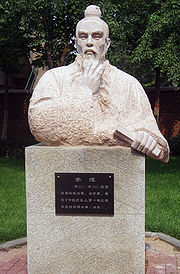.gif)
Li Kui (legalism)
Encyclopedia

403 BC
Year 403 BC was a year of the pre-Julian Roman calendar. At the time, it was known as the Year of the Tribunate of Mamercinus, Varus, Potitus, Iullus, Crassus and Fusus...
-387 BC
387 BC
Year 387 BC was a year of the pre-Julian Roman calendar. At the time, it was known as the Year of the Tribunate of Papirius, Fidenas, Mamercinus, Lanatus and Poplicola...
) in the state of Wei
Wei (state)
The State of Wei was a Zhou Dynasty vassal state during the Warring States Period of Chinese history. Its territory lay between the states of Qin and Qi and included parts of modern day Henan, Hebei, Shanxi and Shandong...
. In 407 BC
407 BC
Year 407 BC was a year of the pre-Julian Roman calendar. At the time, it was known as the Year of the Tribunate of Medullinus, Vibulanus, Volusus and Ahala...
, he wrote the Book of Law
Book of Law
The Canon of Laws or Classic of Law is a lost legal code that has been attributed to Lǐ Kuǐ , a Legalist scholar and minister who lived in the State of Wei during the Warring States Period of Chinese history...
(Fajing, 法经), which was the basis for the codified laws of the Qin
Qin Dynasty
The Qin Dynasty was the first imperial dynasty of China, lasting from 221 to 207 BC. The Qin state derived its name from its heartland of Qin, in modern-day Shaanxi. The strength of the Qin state was greatly increased by the legalist reforms of Shang Yang in the 4th century BC, during the Warring...
and Han
Han Dynasty
The Han Dynasty was the second imperial dynasty of China, preceded by the Qin Dynasty and succeeded by the Three Kingdoms . It was founded by the rebel leader Liu Bang, known posthumously as Emperor Gaozu of Han. It was briefly interrupted by the Xin Dynasty of the former regent Wang Mang...
dynasties. It had a deep influence on state ministers of Qin
Qin (state)
The State of Qin was a Chinese feudal state that existed during the Spring and Autumn and Warring States Periods of Chinese history...
such as Shang Yang
Shang Yang
Shang Yang was an important statesman of the State of Qin during the Warring States Period of Chinese history. Born Wei Yang in the State of Wei, with the support of Duke Xiao of Qin Yang enacted numerous reforms in Qin...
, who formulated the dogma and basis of the harsh Chinese philosophy of Legalism
Legalism (Chinese philosophy)
In Chinese history, Legalism was one of the main philosophic currents during the Warring States Period, although the term itself was invented in the Han Dynasty and thus does not refer to an organized 'school' of thought....
. Along with his contemporary Ximen Bao
Ximen Bao
Ximen Bao was an ancient Chinese government minister and court advisor to Marquis Wen of Wei during the Warring States period of China. He was known as an early rationalist, who had the State of Wei abolish by law the inhumane practice of sacrificing people to river deities...
, he was given oversight in construction of canal
Canal
Canals are man-made channels for water. There are two types of canal:#Waterways: navigable transportation canals used for carrying ships and boats shipping goods and conveying people, further subdivided into two kinds:...
and irrigation
Irrigation
Irrigation may be defined as the science of artificial application of water to the land or soil. It is used to assist in the growing of agricultural crops, maintenance of landscapes, and revegetation of disturbed soils in dry areas and during periods of inadequate rainfall...
projects in the State of Wei.

